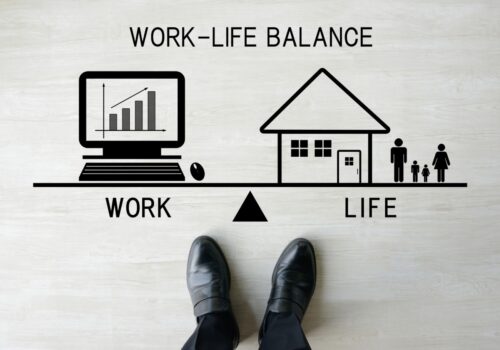One of the most crucial assets of a business is its employees. Happy employees = more profits and business growth.
On average, an employee spends around 8-8.9 hours in the office compared to his 7-8 hour sleep. Also, longer working hours do not necessarily mean more productive employees.
Late sittings in offices do not mean increased efficiency of the employees. Corporate culture is changing, and employees are now given more of a free hand to improve their working abilities. Often we see tech giants like Google and Facebook and get awed by their workspaces.
We all know that our workplace and work have changed. And for the last several years, we’ve had to work remotely through a deadly Covid -19 pandemic in a worst economic situation. Remote working lets employees work from anywhere in the world if they choose to. But amid the global pandemic, employees became tired of their jobs, overworked, and refused jobs for working conditions. The latest of these resistance acts is called quiet quitting, which has taken the internet by storm.
What is Quiet Quitting?
The terminology of quiet quitting emerged in early 2020. Driven mainly by social media, it can be called a state of mind of employees who co-exist in the state of mind between “actively engaged” and “actively disengaged.”
Poor management systems and lack of career opportunities give fuel to quit quitting. It’s a new phenomenon that makes up at least 50% of the U.S. workforce. It is in the condition where employees put no more effort into their jobs than necessary.
Quiet quitters may:
- Attend an official meeting without speaking up
- Refuse overtime
- Bare minimum at work
- Only work in official hours
- Not actively respond to emails or texts
The Truth Behind Quiet Quitting
Companies can no longer ignore their employee’s situation. The hashtag #QuietQuitting has now trended in social media, with 17 million views on TikTok. The Edelman survey report shows that teenagers (18-26) are more worried about security, health, finances, and social connections.
There are two types of employees in a company or organization. Disengaged employees are not satisfied with the work policies, working environment, and many more things and are most likely to leave. On the opposite end of the working environment, actively engaged employees are strongly dedicated to the organization and its goals. They are happy with their job.
Quiet quitters are especially the young people who have suffered the worst pandemic. Forcing someone to do overtime duty and unpaid labour is wrong, but quiet quitters are doing much of this unpaid labor. They are less willing to engage in primary work responsibilities. Different elements of quiet quitting would fit your situation, like a job contract, job environment, personality, and passion.
People always want career growth, salaries, and a good work environment. There may be many reasons to quit their jobs, like lack of growth opportunities, less pay according to workload, or feeling disrespected. But they did not physically quit their job but rather chose to ‘quiet’ quit.

They only choose to complete the bare minimum. They don’t put much effort into their roles, but they’re also not looking to leave. They are often quitting the idea of going ahead in life. Unhappy in the current company, they engage less in their duties.
These employees are not refusing their core task- they don’t put much more effort beyond that. But many companies expect their employees to go beyond the call of duty. The reality is that most jobs cannot be fully described in a formal job contract, so companies or organizations depend on their employees to set up to meet extra effort.
Strong-performing organizations aim for high employee engagement because they recognize that engaged individuals are more likely to develop the best solutions to business challenges and consumer needs, resulting in organizational success.
Many roles, for example, require frequent client interaction, putting these individuals in the best position to uncover customer needs, advise purchasing decisions, and provide excellent customer care. Motivated and devoted employees are much more inclined to go the extra for customers and the company, regardless of their position.
The quiet quitting trend suggests that employees feel the working pressure and the career growth becomes unbalanced: the effort should be equal. Employers are demanding more effort in work without investing in them in return, and that’s why the trend is becoming increasingly common.
Will Quiet Quitting Impact Team Culture and Spirit?
In an organization, some people are happy with the working environment, and they set company-wide work boundaries. On the other side, if one team member is following the quiet quitting, it can destroy the entire coordination.
Poor onboarding makes new hires eight times more likely to be disengaged at work. These findings highlight the need for a comprehensive view of the employee experience, from onboarding through the exit and all stages.
To accomplish its goal, it is of primary importance that an organization ensures that the people who work within its ranks are effectively engaged. Motivation is of key importance to obtain this.
There are also employment law considerations. Employees who adopt quiet quitting cannot be fired because of the legalities and lawsuits over discrimination.
Causes of Quiet Quitting
There may be different causes of quiet quitting which include
- Covid -19 pandemic
- Lack of good working environment
- Lack of communication
- Workplace difficulties
Under the Fair Labor Standards Act (FLSA) in the United States, the majority of employees are entitled to receive at least the federal minimum wage for all hours worked. While there are limited exemptions for specific categories of employees, such as certain tipped workers, the general rule is that employees must be paid at least the minimum wage as mandated by the FLSA.
Why is quiet Quitting So Damaging to Your Career?
Quiet quitting can create many negative effects on the employee. Some are:

Negative Effect on Professional Career
It can severely affect your career, and in finding new employment—employees who adopt quiet quitting look unprofessional and unreliable, damaging their reputation. Employers may only hire someone who has quit their previous job with notice.
Loss of Income
The employees who adopt quiet quitting may not receive their final paycheck or any outstanding pay if they quit without notice. It can create a financial loss for the employee to support themselves and their family.
Loss of Benefits
The employee may lose other benefits through their jobs, such as health insurance, retirement savings plans, or bonus amount. For this, you can face problems in the future.
Negative Emotional Impact
It can create a negative emotional impact on the employee. They may feel sorry for leaving without notice, which can negatively affect their colleagues and the organization.
How Does Quiet Quitting Affect the Employer?
For the company, quiet quitting can lead to different types of problems. It may include:
Loss of Productivity
If an employee leaves the organization without notice, it can disrupt the team. In such case, the employer needs time to find a replacement and train them, which result in a loss of productivity.
Decreased Morale
Quiet quitting creates a toxic working environment and negative workplace culture. An employer may not trust the remaining employees, and this can cause decreased morale and harm the organization’s success.
Legal Issues
There are some legal obligations of the employer to the employee who has quit without notice. If the employee leaves the organization without giving any notice, then it could lead to legal consequences.
Employer’s Responsibility to Prevent Employees from Quiet Quitting:
Here is a list of simple to-do small things to help your employees work more efficiently.
1. Tasks and Skills
One of the major lapses that cause downright inefficiency and loss of interest among the employees is when they are assigned tasks that do not comply with their skill set or personality. Sure, taking them out of their comfort zone is suitable for their growth, but if you just keep assigning random tasks to random employees, you might not get the best results.
While assigning tasks, see which employee can do which task better. Some people are great at doing detail-oriented tasks, some are good with strict rule-intensive tasks, and some are great at being creative. So, assign the tasks accordingly.
You cannot just assign a random task to your employee and expect it to be great. Just because your employee is super-efficient in one thing does not mean he is efficient in another.
2. Clear and Realistic Goals
Now another very important thing is to be clear and realistic while setting goals for your employees. Having realistic goals motivates them to do better and urges them to achieve them.
It has been observed that employees who have a focused aim tend to work for it with a more passionate approach. Let your employees know what you require and how their timely work will affect the company.

One way to ensure your goals are clear is to use the SMART approach. Meaning your goals should be:
- Sustainable
- Measurable
- Attainable
- Realistic
- Timely
So, before you assign any goal to your employee, ensure it fits the abovementioned criteria. It will help your employees to become more focused and efficient.
3. Give and Take Feedback
One thing that your employees want to hear from you is what YOU think of their performance. Give them your feedback consistently, and, more importantly, ask them to share their feedback on the overall company. Give respect to their opinions as well.
Having two-way communication encourages an environment for open dialogue where the opinions of everyone matters. Giving them feedback will help them improve, and their feedback will help you understand what they want.
4. Effective Communication
Things can go wrong if proper communication is not done. Setting clear and precise goals is essential, but clear communication is also important. It has been observed that many problems arise due to misunderstanding or lack of communication.
In the strict corporate culture, emails are usually considered the communication medium, but you should not solely rely on it. According to a study, emails are considered the second most time-consuming activity of an employee, and they take up nearly 28% of their time.
You can use other CRM options like Slack, Piazza, etc., or even better, encourage your employees to do voice-to-voice communication. Placing a quick call is far better than wasting time by sending emails back and forth.
5. Give Way to Delegation
Having the urge to be involved in everything happening around the company is quiet natural, but you don’t want to take that road. It’s an inefficient and tiring process. And you won’t be able to focus on more important things. It will not only waste your time but other people’s as well.
You can assign responsibilities to certain people and trust them to complete that tasks as best as possible. It will give your employees a sense of responsibility and a chance to grow as a manager and leader. It will show how much you trust your employees. You hired them for a reason, and it’s time to give them the limelight they deserve.
Having this culture in a corporate space motivates the employees to do better, making them feel important and trustworthy.
6. Giving Incentives
Nothing motivates employees like incentives. It’s like this reward psychology. Now what do you do to make your employees give their best on the task? Incentivizing your tasks gives them a reason to become more focused and efficient.
You can either set long-term or short-term incentives.
These incentives can be individual or team-based depending upon the tasks. These incentives can be as simple as sending a thank you note or a public recognition.
- A Day-Off: On completing a hectic and tiring project, you can give the dedicated team a day off. It will make your employees feel valued and taken care of.
- Paid Time Off: you can offer paid time off to your employees without needing to use their sick or vacation leaves.
- Offering them a Meal: you can take the team out for a meal. It will increase the team bondage, and all of you can communicate in an open and free environment.
- Handwritten Notes: sending handwritten notes is the best way to show gratitude and acknowledge their efforts. So take some time and write a personalized note to thank them for their efforts.
- Lazy Monday Coupons: who like Mondays? Well, nobody in their right mind. So what’s better than getting an official excuse for coming late? Yes, permit them to visit the office late on a Monday.
Conclusion
Employees lead any organization, and they are the only person by which any organization comes into existence. In any company or organization, the performance of its employees is critical, and there are many ways by which their talents and ability can be developed.
Many organizations arrange seminars, personal training, and workshops to improve employee relations. The organization should make better plans for their employees so that they trust their organization and are able to treat it like their family. Still, there are situations where the employees fail to trust his or her organization and have a healthy relationship with their seniors.
















